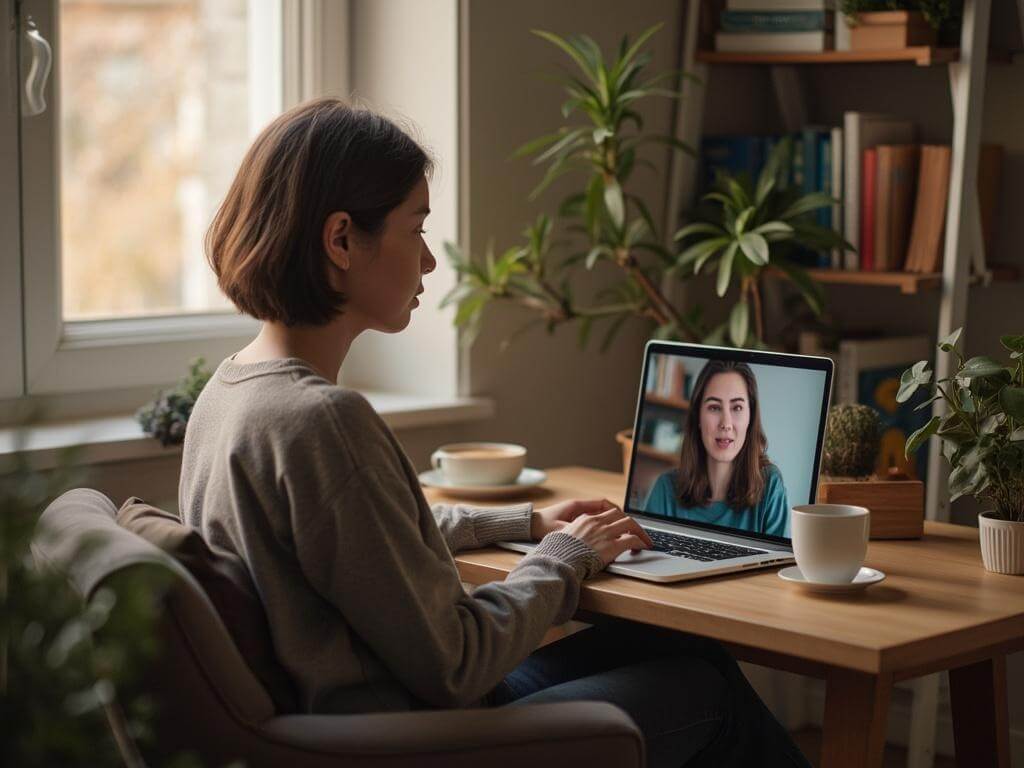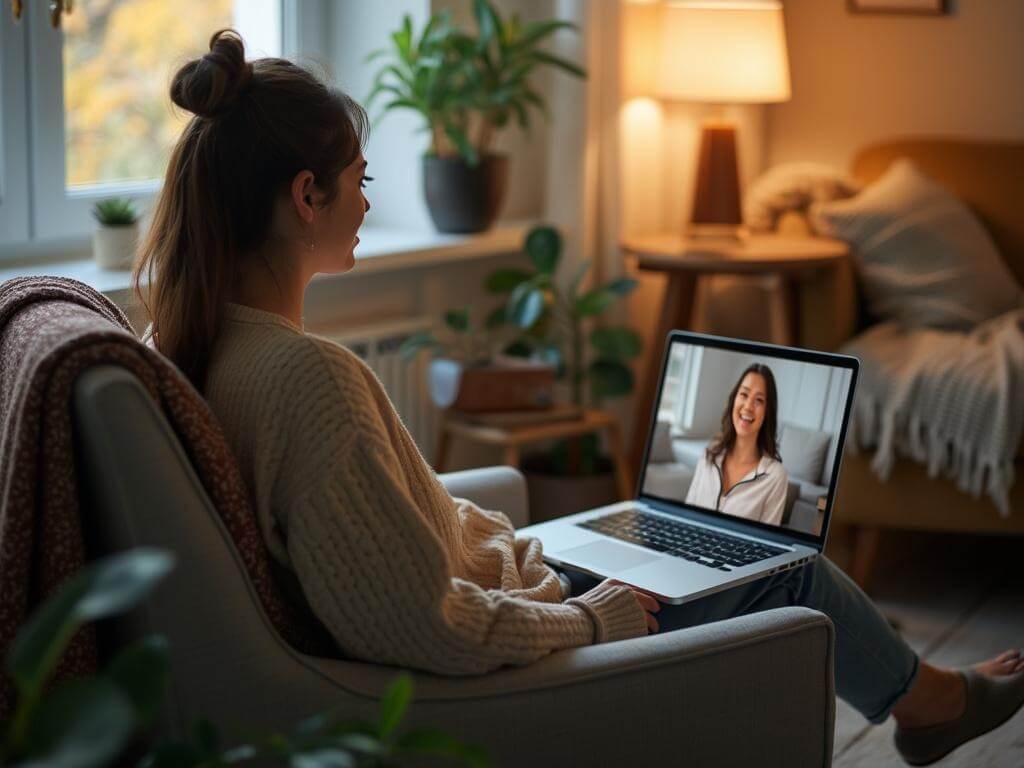Online therapy changed how I think about mental health support—especially after one awkward drive across town for a 45-minute session that cost me more time in traffic than in actual therapy.
That’s why I’m all-in on online therapy.
It’s not just a stopgap—it’s a legit, powerful tool for managing anxiety, depression, grief, and a lot more.
And the best part?
You don’t have to wait six weeks just to get on someone’s schedule.
Let’s dig into what makes it work—and why it might just be your secret weapon for mental wellness.

Why Online Therapy Is Winning (And It’s Not Just About Convenience)
Online therapy is simple.
It means you talk to a licensed therapist using your phone, computer, or tablet—wherever you already are.
No commuting. No waiting rooms. No need to explain why you were late because of a three-car pileup on the freeway.
And studies back this up:
- Research shows that online therapy is just as effective as in-person therapy for most mental health conditions.
- In fact, the American Psychological Association confirms patients in digital therapy report similar improvements, and often higher satisfaction, thanks to flexibility and affordability.
So what can you actually get help for?
- Stress from job burnout
- Relationship tension
- Panic attacks that seem to appear out of nowhere
- Losing motivation, focus, or sleep from chronic anxiety
- Navigating grief after losing a loved one
Plus, online psychiatry lets patients access medication management from qualified psychiatrists—without needing to drive to a clinic every month.
Quick Recap:
Online therapy is legit, flexible, and effective. It cuts out barriers and connects people to care fast.
Now, let’s get a little deeper.
There's effective—and then there's transformative.
And that’s where things like lifestyle psychiatry come in.
Lifestyle Psychiatry: Where Brain and Body Actually Talk to Each Other
I learned this the hard way.
A former patient of mine struggled with severe anxiety, even while taking medication and attending weekly talk therapy.
When we introduced movement (like daily walks), nutrient-dense meals, and no-screen evenings before bed, her brain started to stabilize in a way medication alone couldn’t touch.
That’s lifestyle psychiatry.
It’s the growing field inside psychiatry that goes beyond a prescription pad and looks at the whole picture:
- How you move
- How you eat
- How you sleep
- How stressed you are
- How connected you feel
You’d think this would be baked into psychiatry already—but it’s still shockingly novel in most clinical settings.
Here’s what makes lifestyle psychiatry different:
- Instead of treating just symptoms, it helps treat root causes.
- Instead of over-relying on meds, it teaches patients how to influence their mental health through sustainable changes.
- And instead of long, open-ended therapy, many programs are short-term and structured to provide real traction fast.

What’s In The Toolkit?
It’s not just theory.
Lifestyle psychiatry uses evidence-based approaches like:
- Structured movement or exercise protocols (built around what your body and brain need—not what Instagram says)
- Plant-forward or Mediterranean-style nutrition plans (with registered dietitians when possible)
- Mindfulness, yoga, and breathing techniques
- Deep work on sleep hygiene, blue-light control, and circadian rhythm support
- Wellness coaching to help patients stick to the habits long enough to feel the benefits
It’s all about supporting the brain through the body—without replacing traditional medicine or therapy, but enhancing them.
Think of it like this:
- Medication can quiet the storm.
- Lifestyle can help prevent the storm from recurring.
Who’s it For?
Lifestyle psychiatry is great for adults managing:
- Mild to moderate anxiety or depression
- ADHD or mood instability that responds to structured routines
- Physical issues tied into mental health (like insomnia, chronic fatigue, or metabolic diseases)
But here's the caveat:
- If someone’s in crisis or dealing with psychosis, this shouldn’t be the only form of care.
- It requires patient motivation—this isn’t a passive pill-it-and-forget-it model.
And most programs now offer online access, blending virtual care visits with tools to track habits, attendance, and symptom improvements.
So if a patient doesn’t live near an integrative psychiatrist—they can still get all the benefits remotely.
Quick Summary:
Lifestyle psychiatry targets brain and body together. It’s integrative, often remote, and works best for those who want to harness daily habits for long-term mental wellness.
Here’s Where Lifestyle Psychiatry Meets Tech: Enter Virtual Lifestyle Medicine Programs
This is where it gets interesting.
Let’s say someone has prediabetes, chronic stress, and worsening depression.
That’s not unusual—most chronic diseases are tied together in the real world.
What’s the answer?
Virtual lifestyle medicine programs are now making it easier than ever to reverse or manage chronic illnesses from home—using a similar approach to lifestyle psychiatry, but with a heavier focus on physical health (and often delivered in group visits online).
Think of them as the lifestyle bootcamps your doctor might dream of—delivered via Zoom.
What They Offer (And Why They Work)
These programs typically include:
- Weekly virtual group visits led by physicians, nutritionists, and coaches
- Peer support with other patients on the same journey
- One-on-one wellness coaching for tracking goals and troubleshooting problems
- Modules for specific problems like heart health, stress, sleep, metabolic syndrome, and even brain optimization
Here’s what’s wild:
- CHIP (Complete Health Improvement Program), one of the best-known lifestyle medicine protocols, consistently shows lowered blood pressure, reduced need for diabetes meds, and even weight loss using plant-based nutrition in a group setting.
- In some programs, there are 0% dropout rates. Why? Peer support builds serious accountability.
Plus, insurance is starting to take these seriously—some employers now even cover them.
Real Tech, Not Gimmicks:
- Delivered via HIPAA-compliant portals and telemedicine platforms
- Often use connected devices (like smart scales or glucose monitors) to track progress
- Secure messaging with health coaches keeps momentum going between visits
And patients seem to love it:
- Most report it’s way easier to commit when they’re not going it alone
- Others say being in a “real group” helps normalize their health struggles—and motivates them more than any YouTube video ever did
Ok, Rapid Recap:
Virtual lifestyle medicine programs are scalable, effective, and built to reverse or reduce reliance on meds—for conditions like Type 2 diabetes, hypertension, obesity, sleep issues, and more. And they’re getting more high-tech by the week.
Coming Up: How All These Programs Stack Up—and What You Should Know When Choosing One
But first… how do you actually compare these very different approaches?
Let’s break it down in a simple chart.
(transition continues into next section)
Here’s How Real People Choose What Works for Them (And What You Should Think About Too)
So, how do you actually compare online therapy, lifestyle psychiatry, and virtual lifestyle medicine programs?
They all sound effective. They’re all accessible. But they’re built for different needs.
Let me share what I’ve seen after working with dozens of patients who’ve tried one—or all three.
If someone is stuck in the fog of anxiety, heartbreak, or burnout, and they need someone to talk to now—not next month—online therapy is often the fastest way to show up for their mental health.
But when medications and talk therapy start hitting a limit, and someone wants true recovery—not just symptom control—that’s where lifestyle psychiatry can bring real transformation.
And if someone’s dealing with the double-punch of physical illness and mood decline—say, insulin resistance plus depression—those virtual group models inside lifestyle medicine? They’re a game-changer.
Patients love the structure.
They love the community accountability.
And, honestly, they love not having to Google every single thing about “how to eat healthier with prediabetes.”
When You Want Whole-Person Care, These Are Your Options
Here’s how it looks side-by-side in real life:
- A patient in Florida signs up for an online therapy platform to deal with postpartum anxiety. Weekly video calls with a therapist, no driving, baby asleep in the next room. She calls it a lifesaver.
- Another patient battling both ADHD and weight gain signs up for an integrative psychiatry practice. Medication helps him focus—but it’s the scheduled workouts and digital habit tracking that help him thrive.
- A retired teacher with hypertension joins a 12-week virtual lifestyle medicine course. She logs in every Tuesday for group sessions, learns about plant-based eating, and drops 15 pounds without stepping foot into a clinic.
Different routes. Same goal: better mental and physical health—without all the friction.
Let’s Talk Access—and What Actually Blocks People from Getting Help
Cost and access come up all the time. So let’s clear this up.
A lot of people assume anything virtual must be expensive or niche.
Not true.
Insurance companies are finally catching on. Many are covering teletherapy, online psychiatry, and even structured virtual lifestyle programs.
Some platforms offer tiered pricing, sliding scales, or accept Medicaid and Medicare where applicable.
Still, access gaps exist—especially for people without reliable internet, tech-savvy, or devices.
But that’s where smart programs win.
- Hybrid models offer phone sessions or mailed print copies of materials.
- Some use community centers or libraries for access points.
And the best ones invest in onboarding support—because digital health only works if people can actually use the tech.
Here’s What Patients Say Makes the Difference
These are real messages patients have shared with me after accessing virtual care:
- “I felt in control for the first time.”
- “Finally, someone looked at my whole picture—not just a 15-minute checklist.”
- “Meeting others going through it made me feel less alone...and more accountable.”
That last one? That’s key.
Whether it’s therapy, group visits, or lifestyle change—you’re not meant to do this solo.
Quick Reality Check:
- If you want relief, talk therapy helps.
- If you want change, lifestyle psychiatry builds the foundation.
- If you want transformation—especially in body and brain—virtual lifestyle medicine gives you tools, structure, and support.
What Doctors and Researchers Are Watching Next
This field’s not standing still.
There’s growing buzz around AI-powered mental health tools—but not the gimmicky chatbot stuff.
I’m talking real-time mood tracking paired with trends from your smartwatch.
Think a digital check-in that says: “Hey, missed three nights of sleep and haven’t walked this week—is that linked to your mood drop?”
It’s getting integrated into chronic care plans too.
A few hospitals are already testing models where your primary care doc gets updates from your lifestyle coach and psychiatrist—so everything’s connected.
There’s also a huge push toward health equity.
Programs are scaling down cost, opening up community-based hubs, and offering virtual group visits in multiple languages.
Because let’s be real: The future of healthcare is virtual—but only if it’s truly accessible.
Here’s My Final Take (And It’s Not About Choosing Just One)
Online therapy helped me as a patient when I felt like I had too many open tabs in my brain and no time to get on the couch with a therapist across town.
Lifestyle psychiatry helped me as a clinician when I saw patients finally heal after years of chasing symptom relief.
And virtual lifestyle medicine showed me what happens when we stop separating mind and body and start building plans that actually work in real life.
So maybe you don’t need to choose just one.
Maybe you start with therapy.
Then add in movement, meals, and coaching.
And at some point, you join others doing the same—and you stop feeling like you're carrying this alone.
The bottom line?
The most powerful healthcare doesn’t wait until you’re sick enough to need a prescription.
It starts when you decide you’re worth the effort.
Do something today your future self would thank you for.
Because whether it’s online therapy, lifestyle psychiatry, or virtual lifestyle medicine—it’s all about getting back to who you were before the overwhelm…and becoming who you want to be next.
That’s the power of digital mental health.


.svg)


